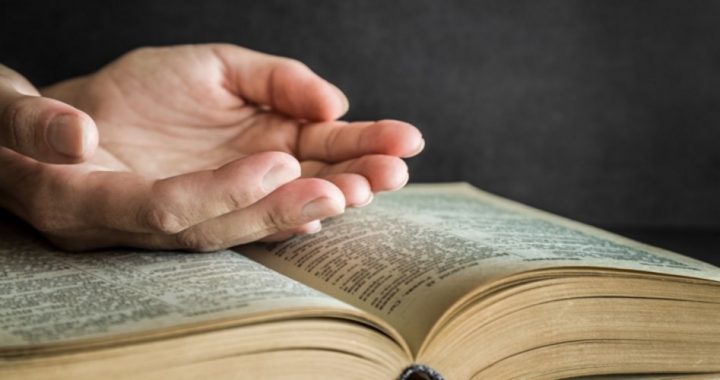
“I would maintain that thanks are the highest form of thought,” wrote G.K. Chesterton in 1917, “and that gratitude is happiness doubled by wonder.” A very deep statement, we can begin to understand it with a simple point. Are we not happy — perhaps even at our happiest — when thankful? On the other hand, aren’t we absolutely miserable when feeling denied something we think we’re owed?
Some may now say that the link between thankfulness and happiness is not causal but correlative. We’re both thankful and happy because we got something we wanted, perhaps something unearned, is the thinking. If this is so, then the secret to happiness could be to get something we want, a gift, all the time. This actually is possible — in a sense.
In the modern age, sadly, holidays and even Holy Days have been hollowed out. Christmas is about presents; Easter about bunnies and chocolate eggs; and Thanksgiving about turkey, football, and, maybe, the materialistic Black Friday that follows. As the name suggests, however, Thanksgiving is about giving thanks. Yet this presupposes that “there must be a recipient to whom we are giving thanks,” as author and radio host Rod Thomson put it Wednesday.
“We are literally giving something,” he continues. “Without there being a recipient of that gift, thankfulness seems an ultimately empty gesture. Thankful to an empty, uncaring, purposeless universe?”
Of course, those birthing Thanksgiving had in mind a very definite recipient: God. As Thomson relates, “After the fall crops were gathered in November 1623, Governor William Bradford of the Plymouth Plantation colony proclaimed: ‘All ye Pilgrims with your wives and little ones, do gather at the Meeting House, on the hill … there to listen to the pastor, and render Thanksgiving to the Almighty God for all His blessings.’” Below is a good PragerU video on the first Thanksgiving.
This theme continued throughout early American history, with Congress creating on November 1, 1777 the first National Thanksgiving Proclamation. In part, it stated that there should be “solemn thanksgiving and praise. That with one heart and one voice the good people may express the grateful feelings of their hearts, and consecrate themselves to the service of their Divine Benefactor.”
On January 1, 1795, George Washington wrote in his famous National Thanksgiving Proclamation that it is “our duty as a people, with devout reverence and affectionate gratitude, to acknowledge our many and great obligations to Almighty God.”
Then, “In the midst of the terrible Civil War 68 years later,” Thomson also writes, “President Abraham Lincoln proclaimed, in accordance with Congress on October 3, 1863, an annual National Day of Thanksgiving ‘on the last Thursday of November, as a day of Thanksgiving and Praise to our beneficent Father who dwelleth in the heavens.’”
Without God, that ultimate recipient of thanks, the “Thanks” and the “giving” are taken from Thanksgiving, reducing it to just “Turkey Day” (praise be the bird?). So it’s clear whom we should thank. But how can we engender that eternal gratitude that can yield abiding happiness? Do we really need, like a child, new gifts continually?
Whether or not we do, we do in fact receive them.
For everything is a gift.
Of course, believing this — and, most significantly, feeling it in our hearts — may be easier said than done.
Perspective always helps, of course. We could note that relative to virtually all the people who ever trod this blue orb, we live opulent lifestyles. We don’t slave away under a burning sun as a medieval serf did, or many still do today, for subsistence wages. We don’t live off blood soup as did a perpetually hungry Spartan boy.
Instead, our supermarkets teem with thousands of delights from the world over at quite manageable prices. Moreover, even most “poor” among us have luxuries — TVs, cellphones, cars, refrigerators, toilets, hot and cold running water, washing machines, etc. — of which even a perfumed 18th-century English lord couldn’t dream. The kicker is that our forefathers did most of the heavy lifting, too.
Yet this doesn’t truly illuminate the matter. Sure, it may inspire some to kiss American terra firma, but it doesn’t explain how the medieval serf could have been thankful or how the woman working an Indochinese rice paddy can be today.
This again is where faith, and the Christian world view, in particular, is invaluable. As to this, at a gathering once and in a modernist fit of pique, a man I know expressed the idea that Christianity “is a religion for losers.” Harsh? Well, note something.
He was right.
For we’re all losers.
In that we’re all sinners.
Relevant here is not just that this tenet of Christianity is true but that, in accordance with Truth’s character, it’s also utilitarian. For gratitude flows from humility, which is born of this knowledge of our fallen state. Upon accepting my sinfulness, I realize I deserve nothing — but damnation. But Christianity also informs that I needn’t suffer such a fate because God is merciful. He is generous, too, and lavishes an unearned bounty upon me.
So to paraphrase Chesterton, goods look a lot better when wrapped as gifts — and everything truly is a gift.
We’ve all met that person with a spirit of entitlement, who can’t even manage a “Thank you” for a favor done. Yet the opposite of this, a grateful heart, is a beautiful thing. It’s also a godly thing, for when we look up at God, we’re not looking down on others. We’re not exalting ourselves, believing we’re owed the world but know we’ve been given it — and the promise of the next world.
A truly happy person knows he is not God, and the better he knows it, the happier he is. So make your fall feast an even happier day, by putting the Thanks and the giving back in Thanksgiving.
Photo: FotoDuets/iStock/Getty Images Plus
This aricle was originally published on November 22, 2018.



